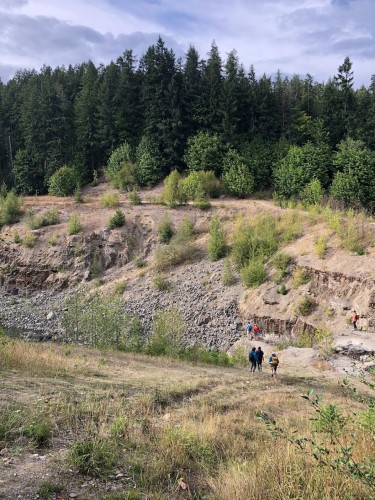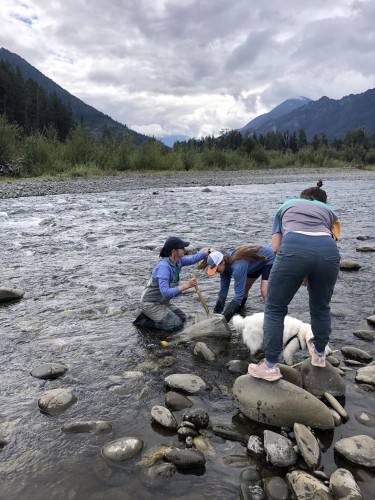Project Update: Visiting NatureBridge in Olympic National Park
A new research partnership
In early September, Alexandra and Heidi traveled to Washington State to visit NatureBridge, an environmental education campus in Olympic National Park. Supported by the Resource Legacy Fund, the visit aimed to explore the potential of a new research partnership between the Center for Community and Citizen Science (CCCS), NatureBridge, and scientists at NOAA around a youth community and citizen science (YCCS) project related to long-term monitoring of the removal the Elwha Dam.
NatureBridge, established in 1971 and operating in three other
National Parks, works with over
35,000 students annually across these campuses to promote
inclusive, inspiring, and informative environmental education
programming to support connection to and stewardship of natural
spaces. Since the removal of the Elwha dam in 2012, the
NatureBridge campus in Olympic National Park has played an
essential role in connecting students to the Elwha River
watershed, collecting data on water quality, and working
collaboratively with various stakeholders to provide hands-on
learning opportunities on the river for students.
Parks, works with over
35,000 students annually across these campuses to promote
inclusive, inspiring, and informative environmental education
programming to support connection to and stewardship of natural
spaces. Since the removal of the Elwha dam in 2012, the
NatureBridge campus in Olympic National Park has played an
essential role in connecting students to the Elwha River
watershed, collecting data on water quality, and working
collaboratively with various stakeholders to provide hands-on
learning opportunities on the river for students.
In Fall 2022, NatureBridge hosted a consortium of scientists and local stakeholders to present the ten years of research that has happened since the dam’s removal. During this meeting, an overwhelming majority of the participants recognized the need for more opportunities for youth to participate in data collection and scientific efforts to monitor the Elwha watershed. Scientists at NOAA, particularly Sarah Morley, shared a research protocol that could incorporate youth participants. This research project studies benthic invertebrates to trace isotopes brought back by salmon into the Elwha watershed from their time in the ocean. Partnering with NatureBridge, she worked with their education staff, like Emily Volz and Chelsea Leaven, to pilot the protocol during Spring 2023.
Excited by this pilot YCCS program, the CCCS reached out to NatureBridge during the summer to see how we might support them. These conversations led to two things of interest: (1) a professional development workshop for their environmental educators on best practices to support student learning during the YCCS project, and (2) a research project to explore the impacts of the project on youth participants Environmental Science Agency (ESA) development.
In September, NatureBridge environmental educators returned to campus for their training in preparation for the fall programming. Alexandra traveled solo to the NatureBridge campus to observe NOAA scientist Sarah Morely lead a training on the YCCS protocol. She got to see how the protocol was implemented and learn about educators’ previous experiences piloting the program in the spring.
 Heidi, returning from a conference
in Turkey and flying immediately up to Washington, joined for the
professional development workshop the next day. Alexandra and
Heidi shared resources about best practices for YCCS, how one
might support ESA development, and ideas for other CCS tools that
could be used, like iNaturalist. The environmental educators
found these resources very useful and appreciated the time to
reflect on best pedagogical practices when leading and teaching
YCCS projects.
Heidi, returning from a conference
in Turkey and flying immediately up to Washington, joined for the
professional development workshop the next day. Alexandra and
Heidi shared resources about best practices for YCCS, how one
might support ESA development, and ideas for other CCS tools that
could be used, like iNaturalist. The environmental educators
found these resources very useful and appreciated the time to
reflect on best pedagogical practices when leading and teaching
YCCS projects.
Since then, Heidi and Alexandra have developed a research plan to study the impacts of the YCCS project on youth participants, working with our educational research collaborator, Chelsea Behymer. The research study will start in Spring 2024. We are so excited about the collaboration between these awesome groups and can’t wait to see what unfolds.








